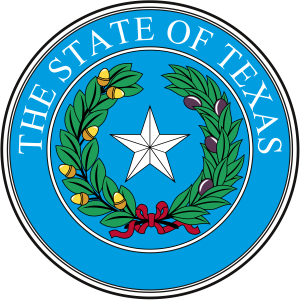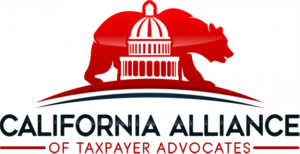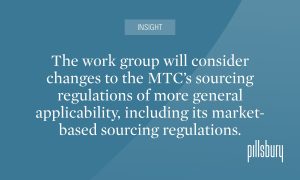The Texas Court of Appeals agreed with Sirius XM Radio Inc.’s (Sirius XM) cost-of-performance (COP) method to determine the fair value of Sirius XM’s services performed in Texas. Continue Reading ›
(COP) method to determine the fair value of Sirius XM’s services performed in Texas. Continue Reading ›
2022 California Alliance of Taxpayer Advocates Annual Conference
Pillsbury SALT partners Breann Robowski and Craig Becker will be presenting at the 2022 California Alliance of Taxpayer Advocates Annual Conference, December 7-9, 2022.

Pillsbury SALT’s Carley Roberts Featured by California Lawyer’s Association’s “Toast to Women in Tax: Inspiring Leadership”

Pillsbury SALT’s Carley Roberts has been featured by California Lawyer’s Association’s “Toast to Women in Tax: Inspiring Leadership” at the 2022 Tax Annual Meeting.
Pillsbury SALT Attorney Zachary Atkins Comments on the Rise of Sourcing Disputes as “Look-Through Sourcing” Methods Gain Traction

Pillsbury SALT’s Zachary Atkins was quoted in the recent Law360 article, “‘Look-Through’ Sourcing Causes Many Disputes, Panelists Say.”
For more information, click here.
Three Strikes, You’re Out! New York Has Another Miss in Sales Tax Case Against a Service Provider Under the “Primary Function” Test

An administrative law judge (ALJ) in the New York State Division of Tax Appeals cancelled the New York State Division of Taxation’s notice of determination asserting sales tax on petitioner’s verification services. The October 6, 2022 determination in Matter of Employment Screening Services, LLC, confirms that petitioner’s services are properly characterized as nontaxable information services because this verification report is tailored and customized based upon the specific applicant.
“Primary Function” Test Propels Yet Another Service Provider to Victory in New York Sales Tax Case

An administrative law judge in the New York State Division of Tax Appeals rejected the state’s position that a taxpayer providing a web-based service which allowed clients to identify effective and ineffective messaging through information, analysis, and reports was selling taxable software. Following the rationale applied in a series of recent sales tax cases, including Matter of 1Life Healthcare, Inc., DTA No. 829434, and Matter of Breakdown Services, Ltd., DTA No. 829396, the judge concluded in her September 29, 2022 determination that the taxpayer’s service was nontaxable because its primary function was an information service that was personal or individual in nature.
The California Franchise Tax Board Fails to Follow the Order of Its Market-Based Sourcing Cascading Rules

In the Appeal of Sheward, 2022-OTA-228P (May 25, 2022), the California Office of Tax Appeals (OTA) held the California Franchise Tax Board (FTB) failed to follow its own market-based sourcing apportionment regulation by prematurely using reasonable approximation to source the income of a multistate unitary business. During the tax year 2017, the taxpayer operated a business providing in-person services as a horse racetrack judge in California and Minnesota but failed to file a California return. Related to such services, the taxpayer received Form 1099s from the State of California, the State of Minnesota, and Minnesota Harness Racing, Inc.
Maryland Court Invalidates Maryland’s First-of-Its-Kind Digital Ad Tax
A Maryland state court struck down the state’s Digital Advertising Gross Revenues Tax (“Digital Ad Tax”) as invalid under both the federal Internet Tax Freedom Act (“ITFA”) and U.S. Constitution. 
Enacted February 12, 2021, Maryland’s Digital Ad Tax by its terms applies to any person with at least $1 million of annual gross revenues from digital advertising services in Maryland and global annual gross revenues of at least $100 million. The tax applies broadly to “digital advertising services,” including banner advertisements, search engine advertisements, interstitial advertisements, and other comparable advertising services accessed on a digital interface in Maryland. The Digital Ad Tax is imposed on revenue derived from digital advertising services in Maryland and applies at rates increasing from 2.5% to 10% depending on the taxpayer’s global annual gross revenue, regardless of where the revenue is earned. Continue Reading ›
Everything in its Place: New Mexico Hearing Officer Finds Markup for Out-of-State Service is Exempt, While Reimbursements for New Mexico Employee Payroll are Taxable

A New Mexico Hearing Officer found that Gross Receipts Tax does not apply to a taxpayer’s markup for services performed outside New Mexico, but the taxpayer’s reimbursements for payroll to New Mexico employees are taxable New Mexico receipts. In Protest of Talbridge, the taxpayer was a Texas employment agency with no offices in New Mexico that was the legal employer of individuals providing services to a client in New Mexico. The client recruited and interviewed candidates and, if hired, provided the employee a list from which to select their desired payroll provider. If the employee chose the taxpayer, the taxpayer charged the client the payroll expense plus a percentage (“markup”) as compensation for its services.
The Curious First Meeting of the MTC’s Model Receipts Sourcing Regulations Work Group
The SALT team briefs the outcomes of the first meeting of the Multistate Tax Commission (MTC).
Read More: Model Receipts Sourcing Regulations Work Group’s Curious First Meeting(pillsburylaw.com)




